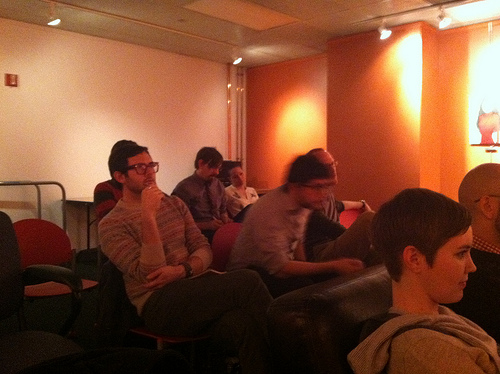
Graduate School?
[flickr id=”8206669730″ thumbnail=”medium” overlay=”true” size=”original” group=”” align=”none”]
For me it happened near the end of undergrad, when I told my professor I wanted to teach writing. He urged me to get my MA. He said, “if you want a tenure track job, you need a terminal degree, but you should start with an MA, here, with us, before you decide what you want to do after that.” I had no idea what a tenure track job entitled, or even what a terminal degree was. But, I got my MA there, at Western Washington University.
An MFA (or MA) in writing/poetry is not about writing. An MFA program is about the community. I mean, YES, it is about writing. Yes, you practice your craft, you get better, BUT ONLY IF YOU ARE WILLING. There are some folks who don’t get better, because they are unwilling to listen, or learn, or even trust their cohort. Some of the best writers I knew are doing jack, because they refused to believe that their community of writers had anything valuable to say. So, if you’re thinking about an MFA in poetry (or any kind of writing), you need to be willing to let go of what you think IS your work AND what you think you know about your work. (It’s starting to sound like Fight Club.) An MFA, in many ways, is about letting go.
Yeah, I know, some people will not understand your work. Yeah, yeah, yeah. I’ve heard that. Listen: Yes, some people won’t. But you will find that your best readers will emerge in a program, and many times, they’re poetics or style will be planets away from yours.
Your cohort is the most important part of graduate school. Yes, there is that BS of a paper chase—YOU NEED THIS TERMINAL DEGREE—but that’s just the paper work. The network of writers, poets, professors, and friends you make in school is vital. Some of them will go on to work for presses and journals and colleges: It’s true that it matters who you know. Not always, but yes, many times, it does. In fact, I found my two publishers through my friends at New Mexico State.
[flickr id=”8205582643″ thumbnail=”medium” overlay=”true” size=”original” group=”” align=”none”]
See, the thing about an MFA community is that it’s a safe place to experiment, mess up, submit, meet people, mess with poetics, make outlandish claims about poetry, all with a group of people who will support you through it. And, when you’re done and no longer have workshops or teacher conferences or thesis development, who do you think will read your work? Your cohort! I still pass back and forth short stories with my fiction cohort from Western and with some of the poetry folk from New Mexico State. Graduate school is like building a long-term writers group.
When I talk about graduate school, I don’t talk about the curriculum or the program; I talk about the people.
Community, kids. That’s what it’s all about.
Do you have any questions about graduate school, about MFAs, about whatever? Hit me up: poetry.mfa@colum.edu
